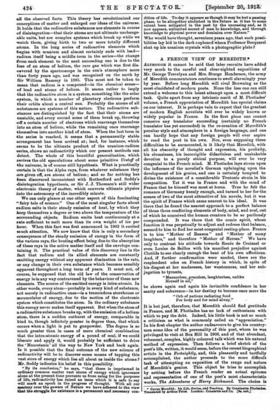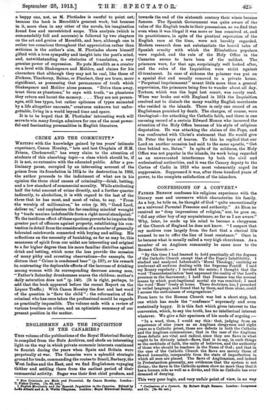A FRENCH VIEW OF MEREDITH.* ALTHOUGH it cannot be said
that later recruits have added very much to the careful and clear-sighted expositions of Mr. George Trevelyan and Mrs. Sturge Henderson, the army of Meredith commentators continues to swell alarmingly year by year. Before long Meredith will rival Browning as the most elucidated of modern poets. None the less one can still extend a welcome to this latest attempt upon a most difficult task. Quite apart from any intrinsic merit of M. Photiades' volume, a French appreciation of Meredith has special claims on our interest. It is perhaps vain to expect that the greatest of modern English novelists will ever be widely known or widely popular in France. In the first place one cannot conceive any translator succeeding (certainly no French translator has yet succeeded) in the re-creation of Meredith's peculiar style and atmosphere in a foreign language, and one can hardly hope that any foreign people will ever aspire to read the poet in his own. Nor, even supposing these difficulties to be surmounted, is it likely that Meredith, with all his obscurity of thought and expression, his prolixity, his clumsiness, his incorrigible didacticism and unshakable devotion to a purely ethical purpose, will ever be very congenial to the French mind. M. Photiades lays stress upon the influence of the novelist's German upbringing upon the development of his genius, and one is certainly tempted to divine the existence of a considerable Teutonic strain in his composition. Yet it was in France and with the mind of France that he himself was most at home. True he felt the romance of Germany keenly enough, and turned to her for the scenes of two of the most attractive of his novels, but it was the spirit of France which came nearest to his ideal. It was there that he found the nearest approach to a perfect balance of those three conflicting elements of body, mind, and soul, out of which he conceived the human creature to be so perilously compounded. It was there that the comic spirit, whose function it was perpetually to adjust and redress that balance, seemed to him to find her most congenial resting-place. France is to him "Mother of Reason" and "Mother of many laughters," and therefore "Mother of Heroes." We have only to contrast his attitude towards Renee de Croisnel or even Louise de Seilles with his manifest prejudice against Clotilde to see clearly enough the bent of his own affections. And, if further confirmation were needed, there are the resplendent odes on French history in which, in spite of his disgust at her madnesses, her wantonness, and her sub- jugation to tyrants,
"Mannerless, graceless, laughterless, unlike Herself in all,"
he shows again and again his invincible confidence in her sanity and coherence—in her destiny to become once more the " Orb of nations radiating food
For body and for mind alway."
It is but just, therefore, that Meredith should find gratitude in France, and M. Photiades has no lack of enthusiasm with which to pay the debt. Indeed, his little book is not so much a criticism as what is commonly called an "appreciation." In his first chapter the author endeavours to give his country- men some idea of the personality of this poet, whom he was privileged to visit at Box Hill in 1908, and of that abundant, vehement, complex, highly coloured talk which was his natural method of expression. Then follows a brief sketch of the poet's life, written, it would seem, before the recent biographical article in the Fortnightly, and, this pleasantly and tactfully accomplished, the author proceeds to the more difficult task of attempting an exposition of the range and nature of Meredith's genius. This object he tries to accomplish by setting before the French reader an actual epitome and representation of one of the poet's most characteristic works, The Adventures of Harry Richmond. The choice is
.• George Meredith: his Life, Genius, and Teaching. By Constantin Photindes. Translated by Arthur Price. London: Constable and Co. [Ss. net.] a happy one, not, as M. Photiades is careful to point out; because the book is Meredith's greatest work, but because in it, more than in any other of the novels, his imagination found free and unrestricted scope. This analysis (which is commendably full and accurate) is followed by two chapters on the art and genius of Meredith, and here, although one is rather too conscious throughout that appreciation rather than Briticism is the author's aim, M. Photiades shows himself gifted with a true sympathy and insight into the poet's mind, and, notwithstanding the obstacles of translation, a very genuine power of expression. He puts Meredith as a creator en a level with Shakespeare and Moliere, and claims for his characters that although they may not be real, like those of Dickens, Thackeray, Balzac, or Flaubert, they are truer, more significant, as possessing that permanence of truth which Shakespeare and Moliere alone possess. " Drive them away, treat them as phantoms," he says with truth, " as phantoms they return and haunt the memory. . . . They are not person- ages, still less types, but rather epitomes of types animated by a life altogether uncreate," creatures unknown but unfor- gettable, living in a world beyond time and space.
It is to be hoped that M. Photiades' interesting work will serve to win many foreign admirers for one of the most power- ful and fascinating personalities in English literature.











































 Previous page
Previous page